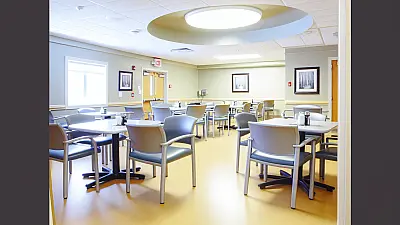TWIN CITY, GA - A June 2024 inspection at Twin View Health and Rehab documented widespread fly infestations in kitchen and dining areas where residents receive their meals, with multiple safety violations that could pose serious health risks to vulnerable nursing home residents.

Fly Infestation Documented During Active Meal Service
Federal inspectors observed a substantial number of live flies throughout the facility's main kitchen during multiple visits on June 18 and 19, 2024. The contamination was so severe that it extended into the dining hall where residents were actively eating their lunch.
During the midday meal service on June 18, inspectors witnessed multiple residents swatting flies away while trying to eat their lunch in the main dining hall. This created an unsanitary dining environment that violated federal standards requiring food service areas to be kept clean and protected from insects.
The source of the infestation was traced to a broken back door in the main kitchen that had been damaged for an extended period. The door remained slightly open with a gap at the top, creating an entry point for flies and other insects. Despite having an air curtain system designed to prevent insect intrusion, staff sometimes turned off this protective barrier, further compromising food safety.
Uncovered Beverages Exposed to Contamination
On June 19, inspectors discovered another serious violation when they found multiple eight-ounce glasses of juice, tea, and water left uncovered while insects flew overhead. The facility's Dietary Manager acknowledged the problem during the inspection and admitted that beverages should have been covered after preparation to prevent contamination.
This violation represents a direct threat to resident health, as uncovered beverages can become contaminated with bacteria and pathogens carried by flies and other insects. The exposure occurred in areas where vulnerable elderly residents receive their daily nutrition and hydration.
Health Risks and Medical Implications
Fly infestations in food service areas pose significant health risks, particularly for nursing home residents who often have compromised immune systems. Flies are known carriers of numerous pathogens including Salmonella, E. coli, and Shigella, which can cause severe gastrointestinal illness.
For elderly nursing home residents, foodborne illnesses can be particularly dangerous, potentially leading to dehydration, malnutrition, and life-threatening complications. The combination of flies in food preparation areas and uncovered beverages creates multiple pathways for pathogen transmission.
Proper food safety protocols require kitchen doors to remain closed and functional, beverages to be covered when not immediately served, and comprehensive pest control measures to maintain sanitary conditions. Air curtain systems must remain operational to create barriers against insect intrusion.
Facility Response and Maintenance Issues
The facility's Maintenance Director revealed that pest control treatments occurred monthly in the kitchen and dining areas. However, he stated he was unaware the back kitchen door needed replacement, highlighting a communication breakdown in maintenance protocols.
Following the inspection findings, maintenance staff proposed installing weather stripping as a temporary solution until a new door could be ordered. This response suggests the facility recognized the severity of the violation and took immediate steps toward correction.
The incident also revealed operational issues with staff occasionally turning off the air curtain system, which compromised the facility's primary defense against insect intrusion into food service areas.
Industry Standards and Prevention Measures
Federal regulations require nursing homes to maintain clean, pest-free environments in all food service areas. This includes properly functioning doors and barriers, covered food and beverages, and effective pest control programs that prevent rather than just treat infestations.
Best practices for nursing home food safety include regular maintenance inspections of kitchen doors and seals, staff training on proper food handling procedures, and systematic monitoring of pest control measures. Facilities should also implement redundant protective systems, such as maintaining air curtains while ensuring physical barriers like doors remain intact.
Additional Issues Identified
The inspection documented ongoing maintenance failures that allowed the fly infestation to persist over an extended period. The broken door had reportedly needed repair "for a while," indicating systemic issues with maintenance response times and facility oversight of critical infrastructure affecting resident safety.
Full Inspection Report
The details above represent a summary of key findings. View the complete inspection report for Twin View Health and Rehab from 2024-06-21 including all violations, facility responses, and corrective action plans.
💬 Join the Discussion
Comments are moderated. Please keep discussions respectful and relevant to nursing home care quality.